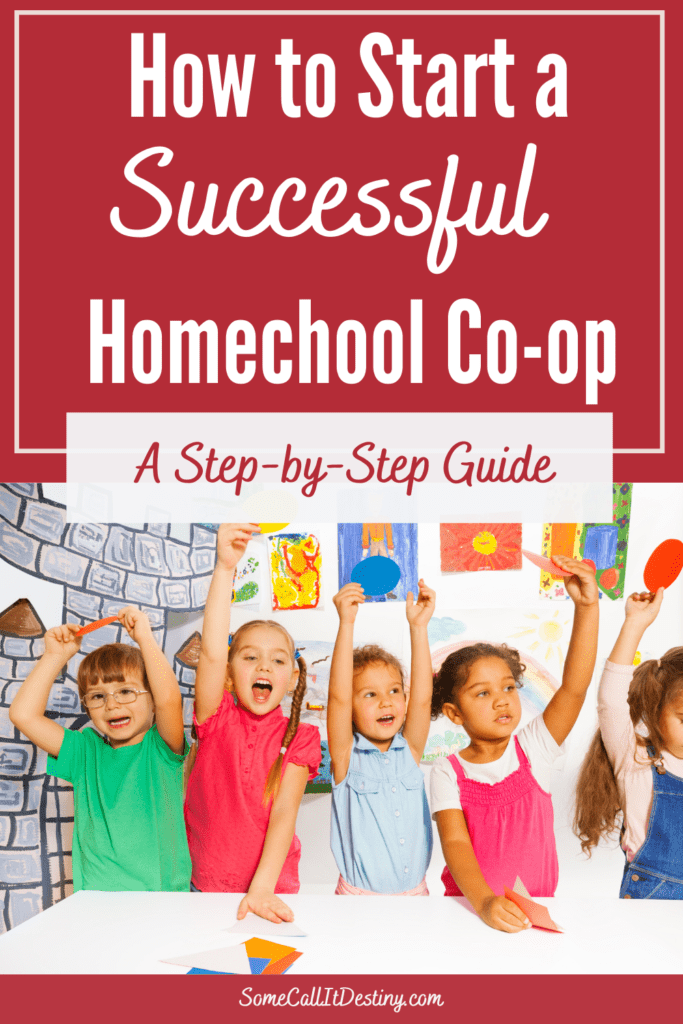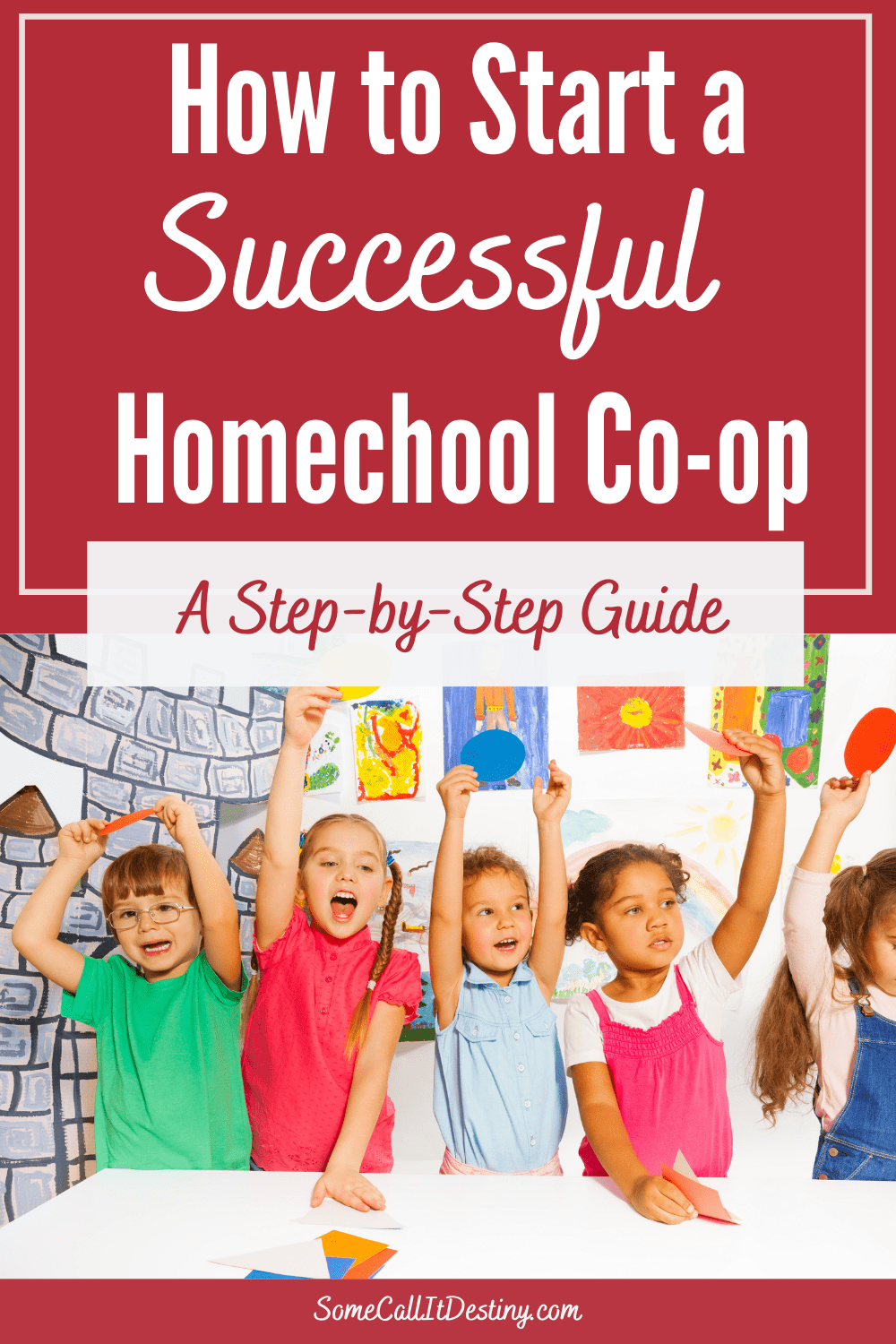How to Start A Successful Homeschool Co-Op: A Step-by-Step Guide
Inside: Your Step-by-Step Guide to Starting a Successful Homeschool Co-op
With the last of the moving boxes unpacked, you decide this is the week to explore the homeschool co-ops in your area. People have mentioned a few of them and you are hopeful one will be a good fit for your family.

The first co-op you find to be too rigid. Run much like a school, with huge time requirements involved for both kids and parents.
A look at the second co-op shows you do not hold the right beliefs to belong and you are quickly shunned.
The last group looks promising if you only had younger kids. Which you don’t.
Unlike Goldilocks, you did not find your “just right” homeschool co-op.
Feeling a little defeated, you realize the only way to find that perfect fit is to start a co-op yourself. But what does starting a homeschool co-op really entail?
- Where to Begin When Starting a Homeschool Co-Op
- Define Your Purpose and Use it As Your Mission Statement
- Naming Your Homeschool Co-Op
- Questing for the Holy Grail: Frequency & Location
- Leadership & Organizational Structure for Your Homeschool Co-Op
- Homeschool Co-op Documents: Registration, Bylaws, Liability Waiver, Code of Conduct, and Statement of Faith
- Member Requirements
- Communicating with Co-op Members
- Inviting Members to Join Your Homeschool Co-op
- Kick-Off Your Co-Op With Success!
Where to Begin When Starting a Homeschool Co-Op

The very first step to starting a homeschool co-op is to check your state’s homeschool laws. You are looking for any rule that either particularly defines what the state recognizes as a homeschool co-op or things a homeschool co-op can’t do because of how the homeschool law is stated.
For example, in Washington State, homeschool co-ops are not defined under homeschool law. However, private schools and daycares are. In order to fall under homeschool law, and not private school or daycare law, homeschool parents are required to be on-site with their children. This is the historical precedence that has been set and accepted by the state to differentiate a homeschool co-op between private schools and daycares.
Your state homeschool organization can help with informing you on the legal rules regarding starting a co-op in your state.
Define Your Purpose and Use it As Your Mission Statement
Now that you know the legal requirements, the next thing to define is the purpose of your co-op? What need are you trying to fill? Homeschool co-ops are as varied as the different families homeschooling. Depending on the purpose, they will function differently.
So what is your purpose?
Are you looking for other homeschool families who share your religious beliefs?
Families to get together and go on homeschool field trips only?
Do you want a variety of extra-curricular activities or perhaps a group of kids to do science classes with?
I suggest writing this down and then using it as your co-op mission statement.

Let’s say you are looking to start a homeschool co-op for your teens. Your purpose may be to have a group of teens for yours to hang out with, but also to do some of the high school classes that are best done in a group setting. You also want other teens who follow the same standards as your family.
Your mission statement, then, might look like this:
This co-op is a united group of homeschooling families who believe that quality education for their teens involves a combination of strong character traits, high spirituality, teamwork, and enriching academic instruction.
In addition to helping you define what you really want from your co-op, the mission statement will let other homeschool families know if it will be a good fit for them.
Naming Your Homeschool Co-Op
The name of a homeschool co-op is typically the first thing individuals learn about your co-op. If it is named well, interested parties will be able to tell immediately if they should inquire further.
For example, if I am looking for a religious co-op, I am going to pass over The Eastside Secular Homeschoolers. But this name also suggests that if I live in the eastside and want a secular homeschool co-op, then it may be a good fit for my family.
Here are some suggestions to think about when naming your co-op:
- Include location
- Specify religious or secular
- Indicate a particular homeschool philosophy
You do not need to include all of these, but you should include at least one.

Here are some sample co-op names that follow one or all of these suggestions:
- Homeschoolers for Him–From this name you can deduce it is a Christian homeschool co-op.
- [Name of City] Charlottle Mason Nature Study Co-op–This lets you know the city where the co-op is located and that they follow a Charlotte Mason philosophy.
- Unschoolers Unleashed–This shows the homeschool philosophy.
- Tri-city Field Trip Group–This gives the location and specifies the type of co-op.
Examples of bad names for homeschool co-ops:
- Mary Beth’s co-op–Aside from knowing there is a Mary Beth, it tells you nothing about the co-op. And what happens if Mary Beth leaves?
- [Name of City] Homeschool co-op–While this does give the location, it is still pretty vague. Adding another detail would be better.
- [No name]–If you have an informal group, you may think you don’t need a name, but then how are people going to find you or others share about your co-op?
So, when choosing a co-op name, put a little thought into it, but don’t overthink it. It doesn’t have to be terribly clever but should relay some idea about the type of co-op or who would be interested in it.
Questing for the Holy Grail: Frequency & Location
Now that you know the type of co-op you want to start, you need to decide how often you want to meet? Twice a week? Once a month? Every Friday? The nature of your co-op will help in determining how often and even what days may be best.
A co-op whose purpose is to meet up for park days may find once a week to be best.
A field trip co-op may have a goal of two field trips a month, as opposed to specific days.
And yet, a co-op that meets for enrichment classes may decide to meet twice a week.
Location for homeschool co-ops can often feel like the quest for the holy grail. Especially, if you are looking for a place to hold classes, as opposed to park days or field trips.

Here are some co-op location suggestions:
- Check local churches, even those you don’t attend. Some allow homeschool groups to use their facilities, although not always for free.
- Local libraries–the downside is you can’t exclude anyone from your activity, so if vagrant Joe wants to sit in on your classes, there’s nothing you can do.
- Someone’s house–depending on the size of your co-op you can meet in someone’s home, or even alternate between homes.
- Public parks
- Local Elks or Moose lodges
- Community centers
- YMCA or Boys & Girls Club
- Hotel meeting rooms
- HOA clubhouses
Leadership & Organizational Structure for Your Homeschool Co-Op
This may seem irrelevant at first, but trust me. You want to have an idea about how you want the co-op to be run.
Will you make all the decisions yourself? Have a board that makes decisions? Will the positions be voted on? How long will they be held for? These are important questions to ask, even if they aren’t immediately applicable.
I was once part of a co-op that wanted to eschew any centralized leadership. They didn’t want any one person or group to be “in charge.” While nice in theory, it doesn’t work in practice. It was hard to be a part of and took forever for anything to get done because no decision could be made without the consent of the whole group. It came as no surprise when it crumbled after a year and was reorganized into two groups with different leadership styles.
A homeschool co-op will run smoothly if it has solid leadership. Likewise, with weak leadership, it will be more likely to fail.
I would suggest at the least, having a President. As your co-op grows, you can fill more roles as needed. However, having the structure in place at the beginning lessens those growing pains and instability.

Homeschool Co-op Documents: Registration, Bylaws, Liability Waiver, Code of Conduct, and Statement of Faith
When it comes to homeschool co-ops, there are typically five types of documents you may come across:
- Registration
- Bylaws
- Liability Waiver
- Code of Conduct
- Statement of Faith
Let’s take a look at each of these in turn.
Co-op Registration Form
The registration form is where you will gather information about your members. It will contain contact information for the primary parent who will be attending, as well as the names and ages of the children participating.
It can also include information on allergies or emergency contacts, if applicable.
If your co-op consists of classes, then this is also how participants would sign up for classes and parents would indicate volunteer time.
Bylaws
The bylaws are the rules for how your co-op is run. They will indicate things such as what constitutes a member, the administration of the co-op, the frequency of meetings, and anything else that may be applicable, including information on how to amend the bylaws. Bylaws are typically available upon request.
Bylaws can be as formal or informal as you desire.
Liability Waiver
The liability waiver essentially states that the co-op is not responsible for any injuries that occur while participating in the co-op. If you are holding the co-op at an individual residence, you will also want a waiver stating the homeowner is not liable.
Some establishments will require a liability waiver before allowing you to use their place to meet, so it’s good to have them on hand.
A liability waiver is different than liability insurance. A new waiver should be signed at the beginning of each co-op year.
Not all homeschool co-ops require a liability waiver, but they are a good idea to have.
Code of Conduct
The purpose of the code of conduct is to be upfront about the behaviors expected from members. Families have different backgrounds and standards and this ensures the same standards are expected of all members.
This is where you see things like, no bullying, no foul language, and being respectful of different beliefs or viewpoints. Some co-ops may have a standard of dress and that would be found in this document as well.
Decide what behaviors are important to you and which ones you don’t want in your co-op and then create your code of conduct.
Code of Conduct forms are usually given to all new members to sign and for existing members to re-sign at the beginning of each year.
Statement of Faith
The Statement of Faith document is most often seen in relation to religious co-ops. This document states the beliefs: religious, political, philosophical, etc that the co-op is governed by.
Many co-ops require members to sign a statement of faith signifying they agree and will uphold those beliefs. The Statement of Faith is usually the deciding factor for many families on whether or not they will join a particular co-op.
If you do not have a particular belief system you follow, for example, let’s say it’s a secular homeschool co-op, you can still have a statement of faith that would say something to the effects of:
We believe everyone has the right to their own personal beliefs and require members to be respectful of differing belief systems.
A Statement of Faith is signed upon joining the homeschool co-op and then yearly thereafter.
Member Requirements
You know what you want from a co-op, but now you need to decide what you want from the members. Depending on the type of homeschool co-op you are running, what you require from other parents will differ.
It is important to be upfront with parents about what your expectations are and what their expected time commitment will be. Most parents enter a homeschool co-op with the expectation of participating in some volunteer capacity, but I have come across others who never want to volunteer for anything. They are happy to ride on the coattails of others and reap the benefits but will bolt as soon as they are expected to contribute.
If your co-op relies on parent participation to function, clearly outline the expectations upfront. This also allows families to decide if they have the time commitment being asked and are willing to be full participants.
Communicating with Co-op Members
Even before you have families join, you need to decide how you will communicate with members. I once belonged to a co-op that used Yahoo groups to relay information. The problem was that Yahoo groups were outdated and no one used it anymore. Most new members hadn’t heard of it and then had to create an account on a platform they didn’t use. And because they didn’t use it, they weren’t in the habit of checking it for information.

I recommend having two modes of communication. The first is email and the second is an app like GroupMe or social media channel. In every co-op, you will have moms who don’t check email and moms who don’t check messaging apps or social media. However, they usually use the other one. This works to cover your bases and makes sure everyone gets the info.
Texting is also an option, but depending on the size of the group, they may not want to be in a huge group text.
Inviting Members to Join Your Homeschool Co-op

You’ve fleshed out what you want your homeschool co-op to look like, now you have to fill it with people.
Word of Mouth
Start by inviting people you know who may be interested. Use word of mouth to spread the word about your co-op.
Co-Op Website & Social Media
Create a website and FB page for your co-op. A website and FB dedicated to your homeschool group allow others searching to find it. You will want at least one of these as a way to make the co-op visible to those looking. Many people do a Google or FB search for homeschool co-ops in their area. This way you grab that traffic of interested families.
FB Groups
Look at posting on Facebook pages dedicated to homeschoolers in the area, or even Neighborhood pages you belong to. If the FB page is for a homeschool community, first make sure it does not belong to a specific co-op already. Also, check group rules to make sure it is ok to post.
State Homeschool Organizations
Most state homeschool organizations will have a place on their website where they collect information for active homeschool co-ops in the state. Email the organization contact and seek to get your co-op listed.
Local Bulletin Boards
Advertize on your community center or library’s bulletin board. Put up a flyer with your co-op information.
Kick-Off Your Co-Op With Success!
Now that you have everything in place, kick off your co-op! There are sure to be some growing pains during the first year, but by following these steps you will have a strong foundation to stand on.







